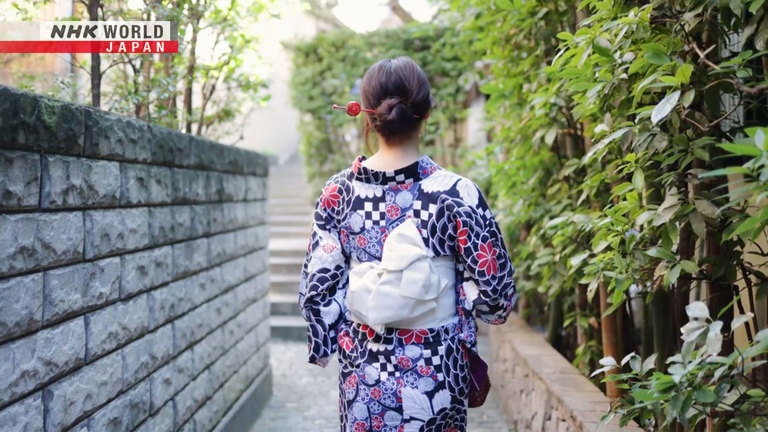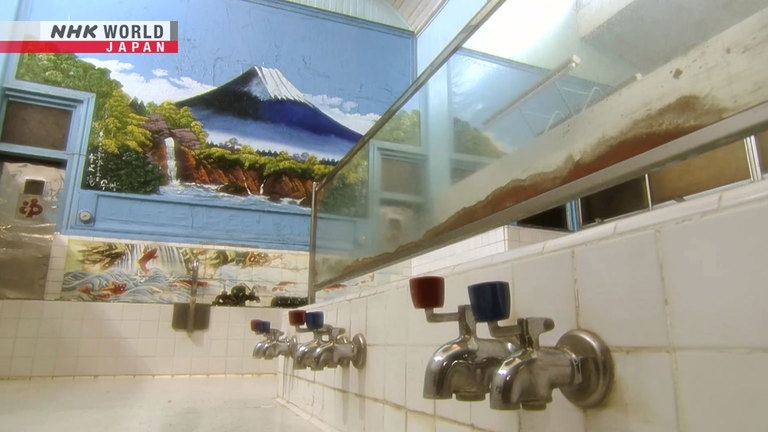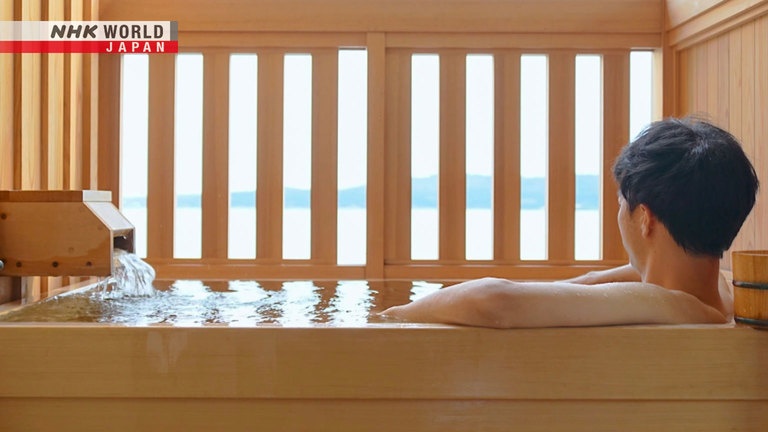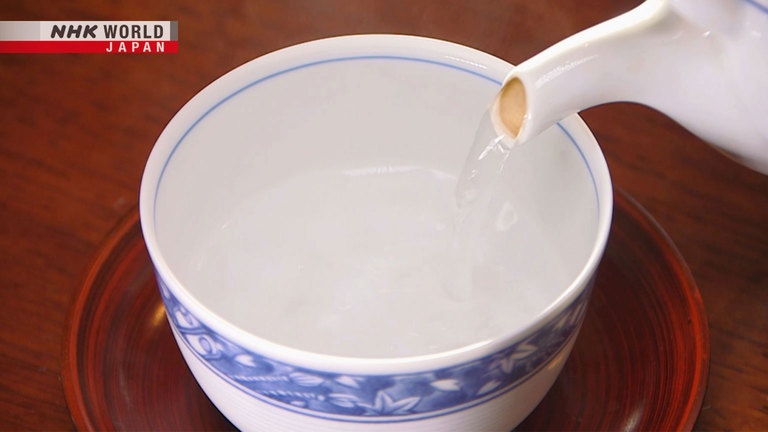Hot Water
The Japanese language is rich in words and expressions influenced by nature, history and culture. This episode focuses on words related to yu, meaning both hot water and a bath. From a nice cup of tea to a soothing bath, hot water is indispensable in daily life. What's more, Japan is famous for its steaming hot springs, with more than 17,000 of them around the country. From his home in Kyoto Prefecture, poet and literary translator Peter MacMillan guides us through words that reveal the warmth Japanese people feel for hot baths and hot water.




Transcript
"Yukigesho."
"Karakurenai."
The Japanese language is rich in unique expressions, that reflect nature and culture.
Magical Japanese.
Today's theme is "yu," or hot water.
From a nice cup of tea to a soothing bath, hot water is indispensable in daily life.
What's more, Japan is famous for its steaming hot springs, with more than 17,000 of them around the country.
Today, we look at words that reveal the warmth Japanese people feel for hot baths and hot water.
Hello! I'm Peter MacMillan.
I've just taken a bath, and the water was perfect!
In Japanese culture, taking a bath is not only about keeping clean, but also about warming up and relaxing.
Actually, did you know that in Japanese, the word "yu" can also be used to mean "bath?"
Let's try to keep ourselves warm, as we look at some Japanese words and phrases related to "yu."
I know! Let's start with this expression.
"yuzame."
"Zame" means "to become cold."
"Yuzame" means to feel chilly after getting warmed up in a hot bath.
When children won't get dressed quickly after their bath, parents often warn about "yuzame."
"yuzame."
Trying to warm up with a long, hot bath isn't always good either...
"yuatari."
"Atari" refers to some kind of harm to the body.
"Yuatari" is when you feel dizzy or sick, after soaking in a hot bath for too long.
These expressions just go to show how much the Japanese people love hot springs.
Speaking of warm water, you might hear the following expression come up in everyday conversation.
"nurumayu ni tsukaru."
"Nuruma" comes from "nurui," meaning "lukewarm."
"Tsukaru" means to soak in something.
The phrase is used for someone in a comfortable or favorable situation, who becomes complacent.
The president rejected my proposal for a new product again.
He says we're doing well and shouldn't risk our success.
He should know that good business won't last forever.
He's the epitome of "nurumayu ni tsukaru," being complacent.
"nurumayu ni tsukaru."
I find it interesting that, in Japan, hot springs are not only seen as places of communication, but also for healing.
"toji."
"Ji" means "to treat" or "to cure," and "to" is another reading for "yu."
"Toji" refers to bathing in a hot spring to treat illnesses or injuries.
The custom of going on "toji" trips is said to have existed by the Nara period, around 1,300 years ago.
But at the time, only a select group of people, such as those in power, had the means to do so.
During the Edo period, roads were developed, making it easier for the general public to travel to far-away hot springs,
and "toji" became more common.
Another popular form of bathing developed at that time:
"sento."
"Sen" means a charge or a fee.
A "sento" is a bathhouse where you pay a small fee to enter.
In the Edo period firewood was expensive, and few homes had baths.
This led to the construction of many "sento."
At the peak, the city of Edo, which became Tokyo, is said to have had around 600 of them.
If you had come to a busy trading port in Edo Period Japan, you might have seen some "yubune," or "bath boats."
They were special boats equipped with bathrooms.
Sailors and passengers from other boats could pay a fee and come aboard to take a bath.
It really gives you a sense for how much the people of Edo Japan loved taking baths.
And when you come out of the bath, you wear one of these.
I even have one of my very own.
"yukata."
"Kata" comes from "katabira," meaning a single-layer kimono.
"Yukata" is short for "yukatabira," which was originally a garment worn after a bath, like a bathrobe or nightgown.
As such, it was seen as inappropriate for wearing in public.
But attitudes gradually relaxed, and people began to wear "yukata" out during hot summer evenings.
And in the Edo period, people began wearing them to festivals.
Now, "yukata" and summertime go hand-in-hand.
"yukata."
It feels great to put on a "yukata" after a hot bath!
Now, the word "yu" is not only associated with baths.
Drinking hot water is also said to be good for your health.
"sayu."
"Sa" is an old Japanese word meaning "pure."
"Sayu" is plain hot water, that is prepared for drinking.
Drinking "sayu" is popular in Japan.
In English, we use the word "water" to refer to both hot and cold water.
In Japanese, while the water is cold, it's called "mizu," but when it is hot, it gets a new name: "yu."
In the Heian Period, hot water was given to people who were so ill, that nothing else would pass their lips.
It was the last thing keeping them alive.
With this background, hot water came to be appreciated as something sacred, and therefore distinct from plain, cold water.
Even so, there is one type of "yu" I would prefer to avoid!
"nieyu o nomasareru."
"Nie" means "boiling," and "nomasareru" means to be served a drink, or to be made to drink.
Just as unknowingly being served boiling water could lead to disaster,
this phrase is used when someone is caught off-guard, and is betrayed.
Sir, the vice president has staged a coup, and you've been toppled!
What! Who would have thought I'd "nieyu o nomasareru," be betrayed...
"nieyu o nomasareru."
Whether hot or cold, water is a precious resource.
And yet, ironically, we have an expression like this:
"yumizu no yo ni tsukau."
"Tsukau" means "to use."
The whole phrase literally means "to use like water," and it refers to lavishly using money and other resources.
In English you might say, "as if it grows on trees."
The expression emerged in the Edo period, when waterworks were developed, and water became more plentiful.
Did you hear that our company's in financial trouble?
No! But I imagine the money's drying up
because the president "yumizu no yo ni tsukau," uses it like it grows on trees.
"yumizu no yo ni tsukau."
What did you think of the uniquely Japanese word "yu?"
I'd better get to bed before I "yuzame."
Perhaps I'll have some "sayu" before I go to sleep.
Don't worry! It isn't "nieyu!"